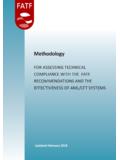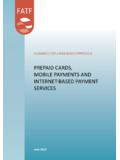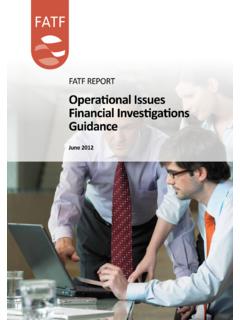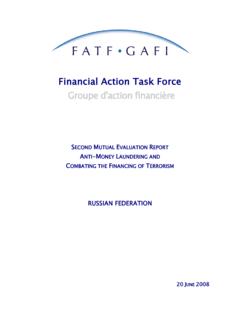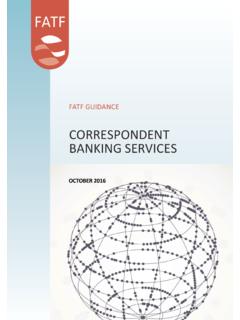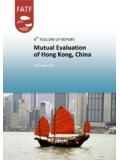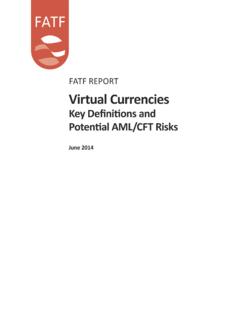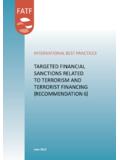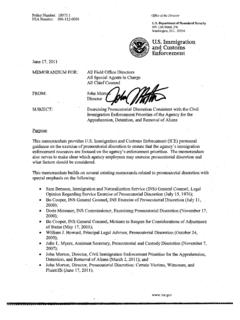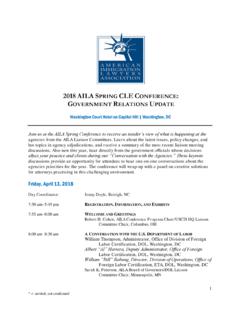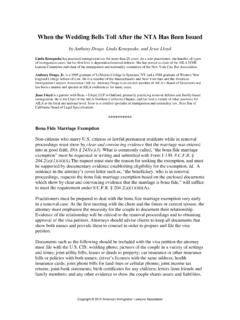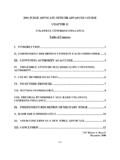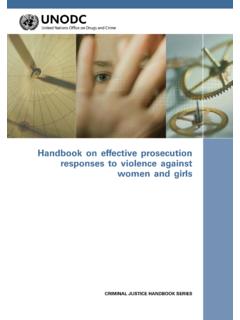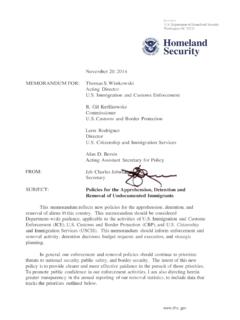Transcription of Financial Action Task Force Groupe d'action …
1 1 Financial Action Task Force Groupe d' Action financi re SUMMARY OF THE FIRST MUTUAL EVALUATION REPORT ON ANTI-MONEY LAUNDERING AND COMBATING THE FINANCING OF TERRORISM PEOPLE S REPUBLIC OF CHINA 29 JUNE 2007 FATF/ME(2007)2/ADD 2 SUMMARY 1. Background Information 1. This report provides a summary of the anti-money laundering (AML)/counter-terrorist financing (CFT) measures in place in the People s Republic of China (China) as of 24 November 2006, and shortly thereafter. The report describes and analyzes those measures, and provides recommendations on how certain aspects of the system could be strengthened.
2 It also sets out the China s levels of compliance with the FATF 40+9 Recommendations (see the attached table on the Ratings of Compliance with the FATF Recommendations). 2. In a very short time, China has made significant progress in implementing AML/CFT measures. China first began seriously focusing on AML/CFT issues in 2003, with the enactment of three sets of regulations that imposed some relevant AML/CFT requirements on the banking, trust and finance sectors. In 2004, the People s Bank of China began conducting on-site AML compliance inspections across the country, and also filed an application for FATF membership.
3 Shortly after becoming an observer to the Financial Action Task Force (FATF) in 2005, China enacted its AML/CFT law and two related regulations in October 2006 which are applicable to all Financial institutions. Since then, China has actively continued to refine and enhance its AML/CFT regime. 2. Legal System and Related Institutional Measures 3. China has criminalised money laundering in three separate articles of the Penal Code (PC): article 349 PC (laundering the proceeds of drug-related offences); article 191 PC laundering the proceeds of drug-related offences, smuggling, organised crime, terrorism, corruption or bribery, disrupting the Financial management order and Financial fraud); and article 312 PC (originally a receiving and handling illegally acquired goods offence, which was recently extended to cover certain types of money laundering activity on the basis of an all crimes approach).
4 These three offences, taken together or separately, cover most of the relevant types of money laundering activity, with the exception of the sole and knowing acquisition and use of proceeds. All but one designated category of predicate offence is fully covered, as the TF offence of article 120bis does not cover an adequate range of activity. Self-laundering is not criminalised, even though there is no fundamental principle of Chinese law that would prevent this. Criminal sanctions for money laundering are effective and dissuasive and comparable with that for other economic crimes (from 5 to 10 years imprisonment, depending on the seriousness of the offence, fines and confiscation of the proceeds).
5 Corporate criminal liability extends to money laundering activity committed pursuant to article 191 PC, but not articles 312 and 349 PC. However, natural persons directly responsible for or representing the legal persons can be criminally liable. Additionally, legal persons incur administrative liability which may lead to withdrawal of their licence or confiscation of their assets. There seems to be a reluctance to go after money laundering as a stand-alone offence, except as an offshoot of a known predicate criminal activity. Although article 191 PC already covered 4 categories of predicate offences since 1997 (drugs, organised crime, smuggling and terrorism), only 3 genuine money laundering cases (involving 4 offenders) have yet been brought before the court.
6 Prosecutions in relation to article 312 PC were relatively high between 2002 and 2005, but are not really relevant in the present context since, at that time, it was exclusively a receiving offence. Since 2002, there have been 146 persons convicted pursuant to article 349 (harbouring drugs, drug offenders, or drug money). This number is low, particularly in the context of the size of the country and the level of money laundering risk. Overall, the effectiveness of the criminal AML effort should be enhanced by raising awareness with the prosecutorial and judicial authorities of the importance of bringing more stand-alone money laundering cases before the court.
7 FATF/ME(2007)2/ADD 34. Article 120bis PC (which was introduced on 29 December 2001) criminalises terrorism financing in the sense that any person who financially supports a terrorist organisation or an individual who commits terrorist activities is guilty of a crime. Not all of the terrorist offences that are listed in the International Convention for the Suppression of Terrorist Financing (1999) are clearly covered, because the Penal Code does not define the term terrorist activities , neither in a generic formulation, nor by way of a list. Moreover, the activity of collecting funds for terrorists or terrorist organisations (either for the purpose of committing a terrorist act or any other purpose) is not criminalised.
8 To the extent that terrorist financing is criminalised, it is a predicate offence for money laundering. Article 120bis PC expressly provides for corporate criminal liability when the offence is committed under the umbrella of or through a legal person, in addition to the personal criminal liability of agents acting on behalf of or within the legal entity. However, at the time of the on-site visit there had been no terrorist financing investigations, prosecutions or convictions. The dissuasive effect of the sanctions is questionable as the punishment for violation of article 120bis PC seems quite low in comparison with the serious threat that the offence poses for public security and society as a whole (a fine and imprisonment of no more than 5 years, unless the circumstances are serious , in which case the maximum term for imprisonment is 15 years).
9 However it is undefined and left to the discretion of the judge to decide what is to be understood as serious . 5. The seizure and confiscation regime is generally both comprehensive and quite detailed. It provides sufficient legal instruments to enable an effective recovery of criminal assets. Some legal imperfections remain, however, such as the fact that the Penal Code does not contain any provision specifically covering the confiscation of property of corresponding/equivalent value. Criminal confiscation is conviction based and mandatory, and covers all illegally obtained assets ( all money and property ), illegal objects ( contraband ) and items used in the commission of the offence.
10 Additionally, there is a fairly extensive administrative enforcement system that is mostly used in cases where the conduct, though unlawful, is not considered serious enough to warrant the application of criminal procedures. Most agencies with administrative enforcement powers can also seize and confiscate assets related to violations within their area of competence. Confiscation is quite actively pursued overall. However, in terms of efficiency the judicial authorities should give more attention to a systematic application of the confiscation of the proceeds, which is a mandatory measure anyway under Chinese law.

